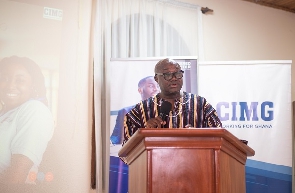The Chartered Institute of Marketing, Ghana (CIMG) has launched the Ghana Customer Satisfaction Index Report (GH-CSI) for 2022. The launch event at the Coconut Grove Hotel in Accra had a hybrid format, with a live TV Broadcast and a substantial online presence on Facebook Live.
The study established an overall CIMG-CSI Performance Index of 98% for Service Quality, for which five banks crossed the threshold. 19 banks performed outstandingly, attaining 5-Star categorisation while 3 other banks earned 4-Star status.
The study, centred on the banking sector, aimed to assess customer sentiments regarding Service Quality, Customer Satisfaction, and Customer Loyalty in both consumer and business banking.
The study focused on the banking sector due to its strong regulation and regulatory oversight, ensuring minimum quality standards. Over 3,000 retail consumers at the branches of Ghana's 22 universal banks in Accra, and over 2,000 business banking customers were surveyed.
In his welcome address, the National President of CIMG, Dr. Daniel Kasser Tee commended the banks for navigating a tough financial year: “The effects of the DDEP on the financial performance of banks for the full year 2022 and the first quarter of 2023, for some, was huge and devastating. Thank God, they have survived it and returned to profitability.”
Dr. Tee announced the inclusion of Business Banking, stating that, “We have been able to expand the study a notch further to cover Business Banking as well, unlike the maiden report that covered only Consumer Banking. By this, we collected and analysed separate data for Consumer banking and Business banking.”
He also urged the 23 universal banks to subscribe to this report as the findings will be very useful in shaping their decisions and actions on the three important study variables of Service Quality, Customer Satisfaction, and Customer Loyalty, and their individual and combined effects on bank performance.
Dr. Tee said that, “consumers of this report, particularly the banks, must learn how to put the results to be announced to good and prudent use. They should juxtapose their performance in each area to the customer’s indication of 'how important' that particular dimension is to them.”
He further added that “high service quality promotes customer satisfaction, which in turn aids in shaping customer behavioural intentions, by way of loyalty, and guarantees positive financial consequences on both the income statements and balance sheets of organizations.”
The chairman for the launch was the Chief Executive Officer at the Ghana Association of Banks (GAB), Mr. John Awuah. He expressed delight with the outcome of the study, stating that “this exercise, you all agree with me is a very important one and personally, I am excited that we have this performance benchmarks particularly on customer satisfaction. Banks can benchmark themselves against each other and identify areas where service standards need improvement.”
Mr. Awuah advised the banks to embrace the report as an indication of customer sentiments: “This is not a CIMG report; this was done in collaboration with technical support from the association and also, from independent customers of the banks who have no interest in marking bank A up or bank B down. So, we take the results as a true reflection of the image that our customers perceive of our banks and our services.”
He further added: “One thing that was almost a constant trend was that, although the star ratings may not have changed, the performance within a certain star category, we saw in several of the metrics, declining which is a worrying trend. As an association we will further dissect the results, providing our members with a comprehensive snapshot. We call on them to take these performance outcomes very seriously and use it to drive their service standards going forward.”
Future surveys will expand to cover a broader range of industries, providing a comprehensive view of the average Ghanaian sentiments towards everyday products and services.
Read the full report below:
General News of Monday, 16 October 2023
Source: CIMG Ghana













